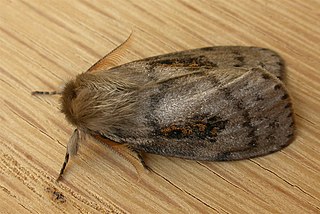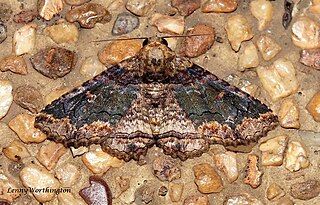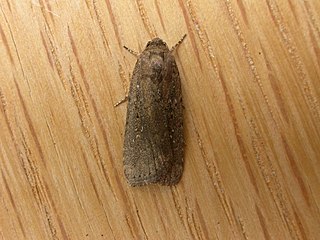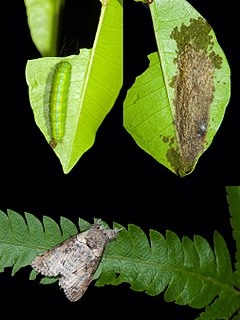
Spilomelinae is a very species-rich subfamily of the lepidopteran family Crambidae, the crambid snout moths. With 4,132 described species in 340 genera worldwide, it is the most speciose group among pyraloids.

Armactica conchidia, the conchidia moth, is a moth of the family Nolidae first described by Arthur Gardiner Butler in 1886. It is found in Australia.

Anestia semiochrea, the marbled footman, is a moth of the subfamily Arctiinae first described by Arthur Gardiner Butler in 1886. It is found in Australian Capital Territory, Queensland and New South Wales.

Athetis is a genus of moths of the family Noctuidae. The genus was erected by Jacob Hübner in 1821.

Ipanica is a genus of moths of the family Noctuidae erected by George Hampson in 1908. Its only species, Ipanica cornigera, the laced day-moth, was first described by Arthur Gardiner Butler in 1886. It is found along the Australian east coast from Queensland to Tasmania.
Pseudephyra is a genus of moths of the family Noctuidae. Is only species, Pseudephyra straminea, is found in Australia. Both the genus and species were first described by Arthur Gardiner Butler in 1886.

Leptocneria is a genus of moths in the subfamily Lymantriinae erected by Arthur Gardiner Butler in 1886. The wings of the moth are generally dark brown, with some variations containing a medley of dark and light hues.

Athetis thoracica is a moth of the family Noctuidae. It is found all over the Indo-Australian and Pacific tropics. It was first recorded from Hawaii in the early 1900s. It is believed to have been accidentally introduced from Fiji. It is now present on Kauai, Oahu, Molokai, Maui and Hawaii.

Pericyma cruegeri, the poinciana looper, is a moth of the family Erebidae. The species was first described by Arthur Gardiner Butler in 1886. It is found in south-east Asia including Hong Kong, Taiwan, Vietnam, Thailand, Sumatra, Peninsular Malaysia, Borneo, the Philippines, New Guinea, and in Australia, northern New South Wales and Queensland. Furthermore, it is an introduced species in Hawaii and Guam, where it was first detected in 1971. In Japan, it was first detected in 1986 in Ishigaki Island and the living area is expanded to Okinawa Island by 2000.

Athetis tenuis is a moth of the family Noctuidae. It is known from all of Australia, including Norfolk Island as well as New Zealand.

Eublemma vestalis is a species of moth of the family Erebidae first described by Arthur Gardiner Butler in 1886. It is found in Queensland in Australia.

Athetis maculatra is a species of moth of the family Noctuidae. It is found in Australia.

Cleora repetita is a species of moth of the family Geometridae first described by Arthur Gardiner Butler in 1882. It is found from Sundaland to Australia and the Solomon Islands.
Scopula emissaria is a moth of the family Geometridae. It was described by Francis Walker in 1861. It is found in India, Sri Lanka, Myanmar, Vietnam, China, Korea, Japan, the Philippines, Sumatra, Java, Wallacea and Australia.

Athetis reclusa is a moth of the family Noctuidae first described by Francis Walker in 1862. It is found from Sundaland to New Caledonia and Fiji. The habitat consists of open areas from sea level up to 1,200 meters.

Athetis hospes, or Porter's rustic, is a moth of the family Noctuidae which was described by Christian Friedrich Freyer in 1835. It is found in Spain, southern France, Italy, on the Balkan Peninsula, Crete, Turkey and northern Iran. The species seems to be expanding its range in north-western Europe with records from Great Britain and the Netherlands.

Gadirtha pulchra is a moth of the family Nolidae first described by Arthur Gardiner Butler in 1886. It is found from the Indian subregion to the Ryukyu Islands in Japan and Thailand, Singapore, New Guinea and Queensland in Australia.

Urapteroides is a genus of moths in the family Uraniidae.















